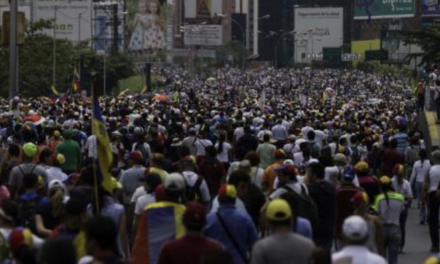Sunday’s Consulta Popular benefitted from the work of a research team that came to accompany the effort and provide their assessment. They were invited by the Comission of Guarantors of the Referendum. Below is a translation of their press release. Overall it praises the effort but does point out two ways in which it did not qualify as an actual electoral process: it did not have an electoral registry and therefore would not be able to detect any kind of multiple voting. As well, in many instances the vote was not secret.
Their complete Spanish-language report can be found here.
Statement from the International Mission of Study and Investigation of the Referendum in Venezuela
By invitation of the Commission of Guarantors of the Referendum called by the Venezuelan National Assembly, an international study and research mission was created for the the July 16th, 2017 electral process. The group consisted of politicians and academics, as well as representatives of institutions that carry out electoral observation in Latin America.
There were two political aspects of this electoral day that stood out. First, the participation of those in charge of electoral tables and concurring to vote was massive. This is an indication of the organizational capacity of civil society—those who took on the cost of some of the activities and materials–and the democratic conviction of the citizens that understand elections to be a privileged of democracy. It is important that the organizers offer detailed, break-downs of participation, and valid and invalid votes for each of the three questions.
Second, the participation of citizens occurred in a calm, even enthusiastic environment. The strong presence of women at the electoral tables merits special mention. The murder of a female citizen in Catia must be sanctioned. It was an isolated event that contrasted with the general setting of serenity, despite that lack of public security measures.
These political facts regarding the initiative called by the National Assembly, overshadow the technical details of the popular consultation. Regarding these elements, it is essential to highlight the organizational capacity necessary to set up more than 14,000 tables in more than 2,000 voting facilities and train those deemed capable of supervising, during a very short period of time. The voting process was manual. The seriousness with which the different individuals involved in the Referendum assumed their roles was notable.
Despite these achievements, it should be stated that while the preliminary data does corroborate the qualitative impression of a large mobilization, the absence of an electoral registry reduced the technical precision of the popular consultation in establishing the level of participation. In addition, there was no guarantee of the secrecy of the vote. It was common for the citizens to vote in front of those in charge of the table. While this did not appear to cause discomfort–and reflected that the event was fundamentally an occurrence of citizens aligned with the opposition–it distanced the Referendum from one of the fundamental characteristics of an electoral event.
The Referendum amounted to a relevant, political event. It was celebrated in a setting in which challenges for the political actors remain; particularly, the necessity to establish permanent, fluid channels of communication between political forces that should perceive each another as antagonists, but not enemies. Those spaces are fundamental for debating and finding solutions for what is a multi-dimensional crisis. This extremely essential task requires a political environment respectful of the rule of law, and respectful of the competencies of each branch of the stae, which today does not exist; framed by constitutional rules, the implementation of an electoral calendar, and the protection of human rights.
In Caracas, July 17th, 2017.
Carlos de Mesa Gisbert
Ex-President of Bolivia
Diana Chávez
Transparency Perú
Alfredo Alcalá Montaño
Civic Alliance Mexico
Natalia Salgado
Citizen Participation Ecuador
Salvador Romero Ballivián
Electoral Advisor




